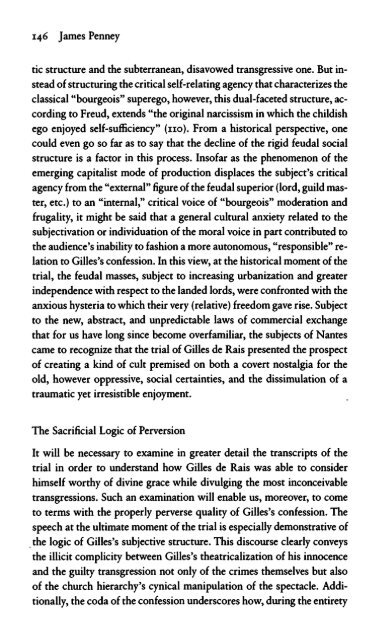Perversion the Social Relation
Perversion the Social Relation
Perversion the Social Relation
- No tags were found...
Create successful ePaper yourself
Turn your PDF publications into a flip-book with our unique Google optimized e-Paper software.
146 James Penneytic structure and <strong>the</strong> subterranean, disavowed transgressive one. But insteadof structuring <strong>the</strong> critical self-relating agency that characterizes <strong>the</strong>classical "bourgeois" superego, however, this dual-faceted structure, accordingto Freud, extends "<strong>the</strong> original narcissism in which <strong>the</strong> childishego enjoyed self-sufficiency" (no). From a historical perspective, onecould even go so far as to say that <strong>the</strong> decline of <strong>the</strong> rigid feudal socialstructure is a factor in this process. Insofar as <strong>the</strong> phenomenon of <strong>the</strong>emerging capitalist mode of production displaces <strong>the</strong> subject's criticalagency from <strong>the</strong> "external" figureof <strong>the</strong> feudal superior (lord, guild master,etc.) to an "internal," critical voice of "bourgeois" moderation andfrugality, it might be said that a general cultural anxiety related to <strong>the</strong>subjectivation or individuation of <strong>the</strong> moral voice in part contributed to<strong>the</strong> audience's inability to fashion a more autonomous, "responsible" relationto Gilles's confession. In this view, at <strong>the</strong> historical moment of <strong>the</strong>trial, <strong>the</strong> feudal masses, subject to increasing urbanization and greaterindependence with respect to <strong>the</strong> landed lords, were confronted with <strong>the</strong>anxious hysteria to which <strong>the</strong>ir very (relative) freedom gave rise. Subjectto <strong>the</strong> new, abstract, and unpredictable laws of commercial exchangethat for us have long since become overfamiliar, <strong>the</strong> subjects of Nantescame to recognize that <strong>the</strong> trial of Gilles de Rais presented <strong>the</strong> prospectof creating a kind of cult premised on both a covert nostalgia for <strong>the</strong>old, however oppressive, social certainties, and <strong>the</strong> dissimulation of atraumatic yet irresistible enjoyment.The Sacrificial Logic of <strong>Perversion</strong>It will be necessary to examine in greater detail <strong>the</strong> transcripts of <strong>the</strong>trial in order to understand how Gilles de Rais was able to considerhimself worthy of divine grace while divulging <strong>the</strong> most inconceivabletransgressions. Such an examination will enable us, moreover, to cometo terms with <strong>the</strong> properly perverse quality of Gilles's confession. Thespeech at <strong>the</strong> ultimate moment of <strong>the</strong> trial is especially demonstrative of<strong>the</strong> logic of Gilles's subjective structure. This discourse clearly conveys<strong>the</strong> illicit complicity between Gilles's <strong>the</strong>atricalization of his innocenceand <strong>the</strong> guilty transgression not only of <strong>the</strong> crimes <strong>the</strong>mselves but alsoof <strong>the</strong> church hierarchy's cynical manipulation of <strong>the</strong> spectacle. Additionally,<strong>the</strong> coda of <strong>the</strong> confession underscores how, during <strong>the</strong> entirety








